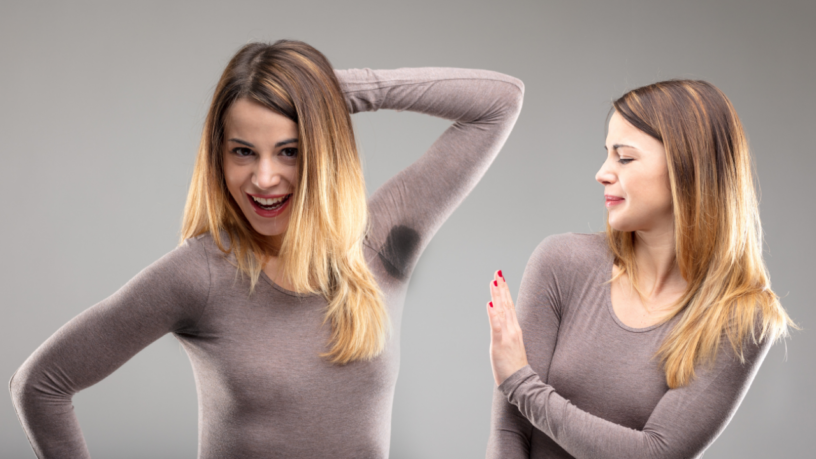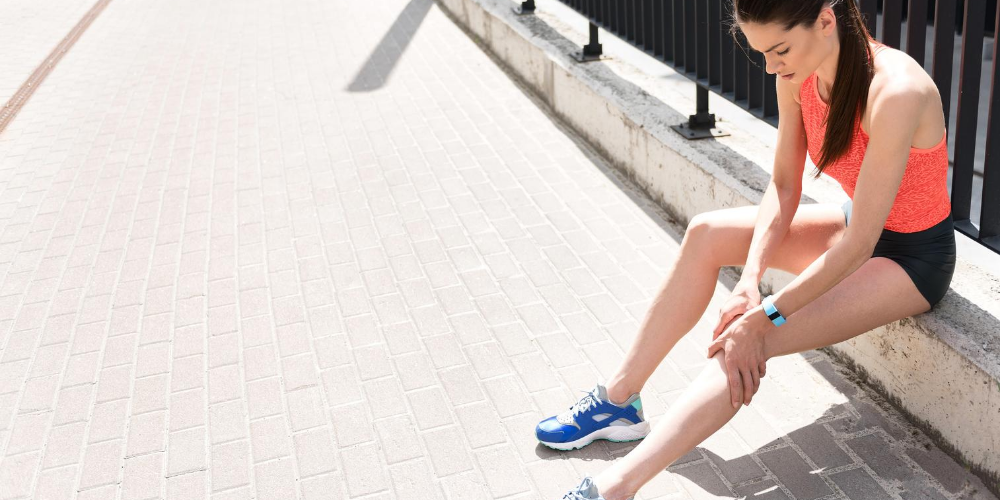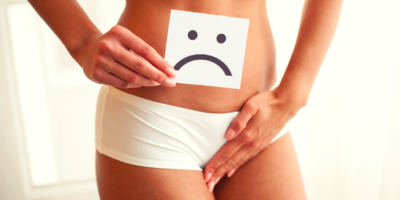What creates a person’s signature aroma?
A lot of things: diet, the overall state of health, age, emotional state, levels of certain hormones, hygiene, and some medications. Some diseases create characteristic chemicals detectable on the skin and in the breath. Examples of illnesses that alter skin smells include infectious diseases (for example, tuberculosis and scarlet fever), scurvy (vitamin C deficiency). Americans tend to be particularly preoccupied with body odor. The armpits are the usual source. Armpit sweat, which is richer in proteins and fats than secretions from the sweat glands covering most of your skin, doesn’t stink until bacteria that normally colonize your skin break down chemicals in sweat into acids.


1. Take a Powder
How it works: Baking soda is a natural odor eliminator. Cornstarch absorbs excess moisture.
- PREPARATION:
- ¼ cup (55 g) baking soda
- ¼ cup (32 g) cornstarch
- DIRECTIONS: Mix the baking soda and cornstarch together in a small glass dish. Apply to underarms with a clean makeup pad. Apply to feet and the insides of shoes to sop up foot odors.
- RECIPE VARIATION: Add 10 to 12 drops of lavender or another favorite essential oil per ½ cup (87 g) of the mixture. Drop the oil into a bowl, pour the powder mixture into a sieve, and shake it into the oil, gradually mixing the two to blend.
- YIELD: MULTIPLE APPLICATIONS
- WARNING: Be careful not to inhale the particles
2. Coconut Tea Tree Deodorizer
How it works: Virgin coconut oil is antibacterial and an emollient. Tea tree oil is antimicrobial. Beeswax holds the mixture together, smells pleasant, and soothes irritated skin.
- PREPARATION:
- 2 tablespoons (28 g) virgin coconut oil
- 1 tablespoon (14 g) grated beeswax
- 8 drops tea tree essential oil
- 2 tablespoons (28 g) baking soda
- 2 tablespoons (16 g) cornstarch
- DIRECTIONS: In a saucepan over low heat, melt the coconut oil and beeswax. (Alternatively, you can use the double-boiler method to make sure you don’t burn the oil.) Once melted, remove from the heat. Immediately add the essential oil, baking soda, and cornstarch and stir to combine. (If you wait, the cooling beeswax will harden the oil, making it difficult to mix in the dry ingredients.) Pour the mixture into a clean, dry, empty push-style deodorant container (recycle a used one). Use a spatula or butter knife to pack in the mixture and smooth over the top.
- YIELD: ENOUGH FOR 1 MEDIUM-SIZE DEODORANT CONTAINER
- NOTE: Alternatively, buy beeswax pastilles (pellet-size pieces of beeswax). If you bought a 1-ounce (28 g) piece of beeswax, simply cut it in half. Save the other half for later.
3. Lavender-Apple Cider Vinegar Wash
How it works: Apple cider vinegar lowers the pH level of the skin (that is, makes the skin more acidic), discouraging bacteria that turn body sweat into body odor. Lavender discourages bacterial growth and adds a scent-ual lift.
- PREPARATION:
- ¼ cup (60 ml) apple cider vinegar
- 6 drops lavender essential oil
- DIRECTIONS: Place the ingredients in a small, clean spray bottle, cap, and shake. Spritz on underarms after a shower or bath.
- YIELD: MULTIPLE APPLICATIONS
4. Sage Therapy
How it works: Sage has a drying effect and is antimicrobial. Combined with the pH-reducing apple cider vinegar, it makes a perfect elixir for reducing perspiration and body odor.
- PREPARATION:
- 2 tablespoons (5 g) crushed or chopped fresh sage
- ¼ cup (60 ml) apple cider vinegar
- DIRECTIONS: Combine the sage and vinegar in the small, clean jar. Cap and shake the mixture until the sage is thoroughly soaked. Place the mixture in the pantry or cabinet for about a week. (This allows the vinegar to extract the essence of the sage.) When the vinegar smells strongly of sage, the potion is ready. Strain the mixture through a cheesecloth and pour it into a small, clean spray bottle. Spritz your underarms, feet, or other body parts prone to odor.
- YIELD: MULTIPLE APPLICATIONS
5. Vinegar Spritz
How it works: Vinegar is acidic, which inhibits bacterial growth. Essential oils (such as rosemary, eucalyptus, tea tree oil, lemon, and lavender) are antibacterial.
- PREPARATION:
- ¼ cup (60 ml) white vinegar
- 12 drops favorite essential oil (eucalyptus, rosemary, lemon, lavender, or tea tree)
- DIRECTIONS: Mix the vinegar and essential oil(s) of your choice. Pour the mixture into a clean spray bottle, cap it tightly, and shake. Spritz your underarms and all over your body.
- YIELD: MULTIPLE APPLICATIONS
6. Essentially Yours
How it works: Witch hazel is astringent and antiseptic; vodka is antibacterial. Lavender, eucalyptus, and sage essential oils are antibacterial, while tea tree oil is antimicrobial. Sage also has dry properties.
- PREPARATION:
- ¼ cup (60 ml) witch hazel
- 1 tablespoon (15 ml) vodka
- 10 drops tea tree oil
- 10 drops lavender essential oil
- 5 drops of eucalyptus essential oil
- 5 drops sage essential oil
- DIRECTIONS: In a clean spray bottle, mix the witch hazel and vodka. Add all the essential oils. Cap and shake the bottle until the ingredients are completely blended. Spritz away at those odiferous body parts.
- YIELD: MULTIPLE APPLICATIONS
7. Aloe Zest
How it works: Aloe vera is antiseptic and soothing. The essential oils are antibacterial.
- PREPARATION:
- ¼ cup (115 g) Aloe vera gel
- 6 drops eucalyptus essential oil
- 6 drops lavender essential oil
- DIRECTIONS: In a small, clean jar, mix the aloe gel with the essential oils, and then shake the jar vigorously until the ingredients are fully blended. With a clean pad or cloth, dab the mixture onto your armpits after showering for a zesty feel and deodorizing action.
- YIELD: 4 TO 6 APPLICATIONS
8. Hydro Solution
How it works: Hydrogen peroxide is antibacterial.
- PREPARATION:
- 1 cup (235 ml) water
- 1 teaspoon (5 ml) hydrogen peroxide (3 percent solution)
- DIRECTIONS: Mix the water and hydrogen peroxide. Using a clean washcloth or pad, wipe the solution on your underarms, feet, or groin and feel refreshed.
- YIELD: 01 APPLICATIONS
9. Refreshing Bath Fizzie
How it works: Citric acid and baking soda are delivery systems for refreshing aromatic essential oils. Eucalyptus and bay laurel essential oils are antibacterial agents that help counter odor-causing skin bacteria.
- PREPARATION:
- ¼ to ½ cup (60 to 120 ml) witch hazel
- ½ cup (115 g) citric acid
- 1 cup (220 g) baking soda
- 15 drops eucalyptus essential oil
- 10 drops bay laurel essential oil
- DIRECTIONS: Pour the witch hazel into a small, clean spray bottle. In a small bowl, combine the citric acid and baking soda. Add the essential oils to the powder one drop at a time, stirring constantly to distribute evenly. Pick up the mixture in your hands and spritz it two times with witch hazel. Keep shaping and spritzing the material with your hands until you have a ball that’s moist but not soggy. Press into muffin tins, filling halfway. Once dry, pop out the frizzies and store them in a tightly capped jar. Add one fizzy to a warm bath.
- YIELD: 06 REFRESHING BATH FIZZIES
Fact or Myth?
- SMELLS FROM SPICY FOODS YOU’VE EATEN ARE RELEASED, IN PART, THROUGH YOUR BREATH. Fact. Onions and garlic, for example, can alter breath and also body odor. If you or your loved ones complain about your aroma after eating such foods, confine their consumption to less social times.
Lifestyle Tip
- Fill an empty box of your favorite scented powder with baking soda, a natural odor eliminator. Use the puff to apply the newly scented baking soda to underarms.
- If you don’t do so already, consider shaving your underarms. Hair holds the bacteria that mix with sweat to create body odor. However, we recommend that if you use aluminum-containing antiperspirants, you shave at night and hold off on using the antiperspirant till morning, giving your body overnight to heal tiny nicks. underarm shaving is a cultural matter and personal decision. More important is to shower at least once a day to wash away bacteria that collect on your skin, as well as on pubic and underarm hair.
- Manage stress. as if there weren’t already enough reasons to tame stress, now we can add an obscure fact: a person’s psychological state affects his or her body odor. You may have noticed that when nervous, not only do you sweat more, but you also smell worse than after a carefree run on a tropical beach.
- If you have stinky feet, sprinkle them with moisture-absorbing cornstarch after your shower. Change your socks often—and go barefoot whenever you can to air out your feet.
- Keep your clothes clean! (remember those kids in college who waited for semester break for mom to do their laundry?) if you sweat easily, change your clothes more often. Do a load of laundry once a week.
When to call the Doctor
- If you are staying clean, practicing good hygiene, eating well, and still experiencing body odor, make an appointment with your doctor. Some medical conditions and medications alter body smells. Also, a condition called hyperhidrosis leads to excessive sweating. Prescription antiperspirants are one possible remedy.
- Also, see your doctor if you notice unusual vaginal odors or discharge. Refrain from using commercially sold vaginal sprays and douches. These products can upset the acid-base balance and kill resident microbes that defend against infection-causing microbes. Plus, if you do have an infection, the pressure of douching can cause the “bad” microbes to ascend into your pelvic organs.






Leave a Reply